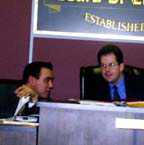The Union City Board of School Estimates passed an approximately $138 million School Budget for 2001-2002 at a public hearing and meeting on March 29. This budget maintained the same tax levy that the Board of Education has received for the past nine years.
The five-member board, chaired by Union City Mayor Brian Stack and including two other commissioners, Michael Leggiero and Ralph Fraguela; and two members of the Board of Education, Lenny Calvo and Adelaide Leone, voted 4-0 for the budget. Fraguela was absent from the meeting.
According to Superintendent of Schools Thomas Highton, only 10.9 percent of the budget is paid for by the municipal tax levy. The remaining 80 percent of the budget comes from state aid.
This budget is broken into three categories: school-based budgets, district-wide expenditures (or the central office budget), and the early childhood program budget.
The individual school-based budgets account for $79 million of the budget, the central office budget accounts for $47 million, and the remaining $12 million is in the early childhood program budget.
Central office expenditures include maintenance and custodians, technology fees and upgrades, transportation services, and tuition for out-of-district placements of students with special needs.
Additional staff
For September, the projected enrollment is 10,821 students in the elementary and high school level, an expected increase of 600 from this year. There will also be approximately 1,400 children in the pre-school, nearly double the number from this year. With such increases in the district’s 11 schools, it seems the only way to correct the overcrowding problem is to hire more teachers.
Highton announced that the district is looking to hire 33 new teachers for September.
“We have been working diligently to reduce class size,” Highton said, explaining that the district has been having trouble reducing the class size in the middle schools and high schools.
According to Highton, the board is looking to hire three teachers in both the Robert Waters and Roosevelt schools and four teachers in Thomas A. Edison School, among others.
“[These hirings] are strictly to reduce class size,” said Highton.
Assistant Superintendent Stanley Sanger said that the more than 50 percent increase in early childhood enrollment is mostly due to the full-day program that is state mandated for all Abbott Districts (urban special-needs districts) beginning on Sept. 1.
Five additional trailer classrooms will also be provided for the early childhood education program.
Starting from scratch
Each of the district’s 11 schools provided their own school-based budget to the Board of School Estimate. According to Board of Education secretary Carl Johnson, the schools used a zero-based budget theory when creating the 2001-2002 budgets. In a zero-based budget, each school was asked to start with a zero balance and re-evaluate the school’s programs to see if they were still necessary or needed to be changed.
“We re-examine every program to see if they were successful,” said Johnson, “rather than just increasing last year’s budget.”
The school-based total budget is $79,135,621. Of that amount, $65.5 million will go toward faculty and staff salaries.
Depending on each school’s enrollment, longevity of faculty and staff and the choice of Whole School Reform Model, each school had a different total budget amount. Whole School Reform is an initiative started in Abbott District schools that allow the community and parents to get involved in the school’s curriculum.
Thomas A. Edison School, with a $12.2 million budget, was the highest elementary school budget. Woodrow Wilson School, with a $2.8 million budget, has the smallest.
Emerson High School has a $12.8 million dollar budget and Union Hill High School has a $12.6 million dollar budget.
